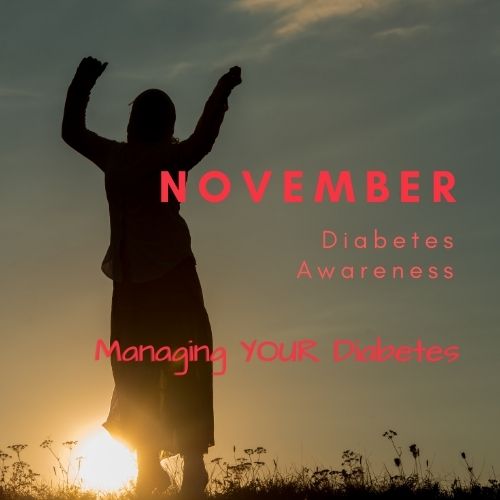Diabetes Awareness: Managing Type 2


November is diabetes awareness month.
Diabetes is a serious condition that, if not properly controlled, can damage your eyes (diabetic retinopathy), your kidneys, your nerves, and lead to problems with the blood flow in your body. But, these diabetes complications don’t have to happen. You can do a lot to prevent them.
The best thing you can do is strive for balance in the food you eat, your physical activity, and your medication. Test your blood to see how the balance is being maintained. Make choices each day to stay balanced.
An Imbalance of Glucose
Most of the food we eat is converted into glucose and used by our bodies as an energy source. The pancreas produces insulin, which is a hormone that signals to the body’s cells to allow in the glucose that is circulating through the bloodstream. If that doesn’t happen, the glucose continues to circulate in your bloodstream.
When you have type 2 diabetes your body either doesn’t make enough insulin or your body is not able to use the insulin effectively. This makes your blood sugar high, and overtime, high blood sugar can cause serious damage to your eyes, kidneys, nerves, and circulation.
The good news is that studies show that keeping your blood glucose levels close to normal can prevent or delay serious diabetes complications.
Creating Balance to Control Your Diabetes
Daily and steady progress toward balance is the key. Be consistent with daily exercise, healthy nutrition, glucose monitoring, and regular visits to your healthcare providers.
Balancing these three things will keep your glucose at a healthy level:
- What you eat and drink
- How much exercise you get
- Taking your medication as prescribed
Try to stay close to your usual schedule of eating, activity, and medication. Drink water. Take your diabetes medicine about the same time each day. Work with your healthcare team to set goals for weight, blood glucose level, and activity.
If you’re late getting a meal or if you’ve been more active than usual, you may need an extra snack to avoid low blood glucose levels. Always carry some type of carbohydrate sugar food or drink with you so you will be ready to treat a low glucose level.
Your blood glucose can go up when you are under stress or sick, so extra care during those times are necessary. Talk with your healthcare team to find help for managing stress or for correct insulin dosage while you are sick with an infection or the flu.
Connect with a Diabetes Care and Education Specialist
Diabetes Self-Management Education and Support (DSMES) services help people with diabetes learn how to take the best care of themselves.
Diabetic care and education specialists are certified healthcare professionals with specialized knowledge in diabetes self-management and care.
Visits to accredited diabetes education specialists are covered by most insurance plans. Medicaid and Medicare Part B cover up to 10 hours of diabetes education the first year after diagnosis. After the first year the coverage may be different. Contact your insurance provider for more information.
Your doctor can give you a referral to a program or you go to Find a Diabetes Education Program in Your Area and locate an accredited diabetes education program near you.
